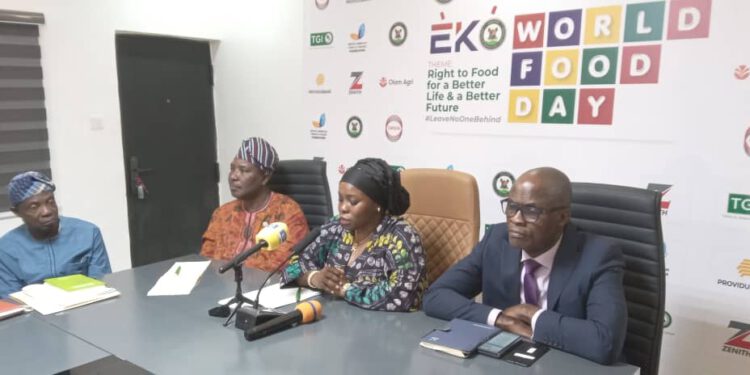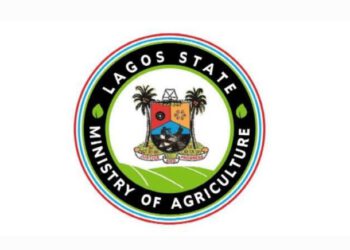The Lagos State Government has renewed its appeal to traders and business owners, urging them not to exploit the current economic situation by making excessive profits at the expense of consumers and residents.
While acknowledging the difficulty of regulating food prices, the government highlighted its interventions, including the Food Hubs in Mushin and the OUNJE EKO initiative, which have been instrumental in providing staple foods to residents at moderated, subsidized rates.
The State Commissioner for Agriculture and Food Systems, Ms. Abisola Olusanya, made this appeal during a news briefing to launch the activities marking the 2024 World Food Day at Alausa Secretariat, Ikeja.
Speaking on this year’s World Food Day theme, “Right to Food for a Better Life and a Better Future,” the Commissioner expressed concern over the exploitation of residents through the sale of food items at abnormal and inflated prices.

She cited the Mushin Food Hub as an example, where eggs and other essential items are sold at affordable prices, adding that the government plans to establish more hubs across the state to help reduce food prices.
Addressing measures to prevent food scarcity, Olusanya explained that although Lagos State does not have a Grain Reserve like the Federal Government, the regular distribution of free food boxes to residents and the establishment of a Logistics Food Hub in Epe will allow for the storage of food for up to 180 days, providing relief during shortages.
To encourage subsistence farming, the Commissioner revealed that the state has distributed free seedlings to farmers in the Ojo area and other locations under the Lagos CARES and APPEALS projects. She also mentioned a collaboration with Glo on the MAgric initiative, which has accelerated food production across the state.
Olusanya vowed that the government will continue to provide necessary support and encourage youths with farmlands and inputs to embrace agriculture, aiming to bridge the food gap by ensuring they sell their harvests back to residents of the state.

Regarding the World Food Day, observed on October 16, Olusanya explained that it provides a platform every year for all countries, including Nigeria, to showcase initiatives focused on improving food security, poverty alleviation, and hunger reduction. She emphasized that this global initiative seeks to address pressing issues and make a significant impact on improving livelihoods.
This year’s edition, themed “Right to Food for a Better Life and a Better Future,” aims to address the serious food security challenges currently being experienced globally.
Food is essential for human existence, and food security, as defined by the United Nations Committee on World Food Security, means that all people, at all times, have unrestricted (physical, social, and economic) access to sufficient, safe, and nutritious food that meets their preferences and dietary needs for an active and healthy life.
The commissioner further noted that a country that ensures food is available to all its citizens will be strong and stable. However, with food insecurity, such a country becomes vulnerable and overly dependent on external aid.

She stressed that this is a time to unite and intensify efforts to build more sustainable food systems by scaling up food production and processing, reducing food waste, and providing decent livelihood opportunities for Lagosians.
In his remarks, the Special Adviser to the Governor on Agriculture and Food Systems, Dr. Oluwarotimi Fashola, stated that the increase in the price of rice is a global phenomenon and not unique to Nigeria.
He explained that paddy production has dwindled over the years, noting that while Nigeria requires about 18 million tons of rice to feed a population of over 200 million, the country produces roughly 8 million tons.
According to him, the cost of a ton of paddy, which was about N200,000 a few months ago, has now risen to N800,000. He added that the impact of collaboration with sister states like Kebbi and Ogun will soon become evident.
He, however, noted that *Eko Rice* remains the cheapest on the market at N72,000 for a 50kg bag, explaining that the state relies on sister states with farmland for cultivation and then buys back the produce from them.
He believes that direct collaboration with the private sector will further help bring down the prices of food items in the metropolis in the long run.
Dr. Fashola, who commended the Federal Government’s decision to allow the importation of brown rice, assured that Lagos would be among the first states to take advantage of this opportunity.
In his comments, the Group Head of Corporate Communications at ORIGIN, Mr. Adebayo Awoniyi-Adeoshun, disclosed that their research showed that 18,000 people accessed the Food Hub in Mushin within a few days, calling on the state to extend the Hub to other areas.
He also urged the state to address the poor condition of the Shagamu-Epe Road, which, he said, could hinder the transportation of food items and other produce to Lagos.
Adebayo Awoniyi-Adeoshun further called on the state to boost the Coconut Value Chain, given the large deposits in the Badagry area of the state.





















